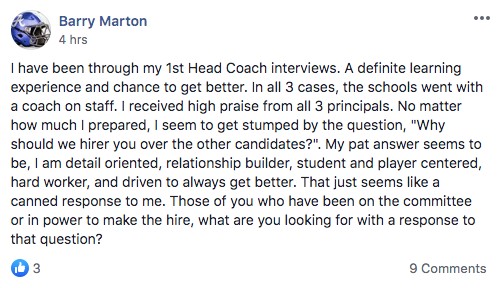Landing a coaching job, or any position for that matter, often hinges on one pivotal question: “Why Should I Hire You?”. This question, seemingly straightforward, is the ultimate opportunity to sell yourself and demonstrate why you are the ideal candidate. Many job seekers, especially in the competitive field of coaching, stumble at this hurdle. They fail to connect their unique strengths and experiences with the specific needs of the school or organization they are hoping to join.
Having spent years on the hiring side, as both an Athletic Director and a Head Coach, I’ve witnessed countless interviews. I’ve seen talented individuals miss the mark simply because they didn’t effectively answer this crucial question. The number one mistake? Failing to align their skills and experiences with the institution’s specific requirements.
This isn’t just about reciting your resume; it’s about showcasing your understanding of their needs and demonstrating how you are the solution. To truly excel, you need to go beyond a generic answer and deliver a response that resonates deeply with the interview panel, proving you’re not just qualified, but the perfect fit.
Unlock the Secret Weapon: In-Depth Research
The key to answering “Why should I hire you?” effectively lies in preparation. Think of it as your secret weapon: meticulous research. You need to become an expert on the school, the athletic program, or the organization you’re interviewing with. This isn’t just skimming their website; it’s a deep dive to uncover their strengths, weaknesses, and aspirations.
In my book, “An Insider’s Guide To Scoring Your Next Coaching Job,” I dedicate a chapter to this concept, titled “Shock the Interview Panel.” The goal is to impress your interviewers with your profound knowledge of their program. Imagine walking into an interview and knowing more about their history, challenges, and opportunities than they do. This level of preparation is not just impressive; it’s often decisive.
Let me share an example. During an interview for an Athletic Director position at a public charter school, my research revealed a startling statistic: only three league championships in their first ten years of athletics. Further investigation pointed to high head coaching turnover as a significant issue, exemplified by five softball coaches in five years. When asked about establishing a winning culture, I highlighted the need for coaching stability, citing the softball program’s turnover rate. A board member, who had been there for a decade, was astonished by this information. “How do you know this? I don’t even know that!” he exclaimed. That’s the power of thorough research – it allows you to “shock” the panel and demonstrate a level of dedication and insight that sets you apart.
Your Research Blueprint: 5 Key Strategies
So, how do you achieve this level of insightful preparation? Here’s your blueprint:
1. Leverage the Power of the Internet: The internet is your starting point for in-depth program analysis.
- Athletic Performance Data: For coaching positions, sites like MaxPreps are invaluable. Analyze team rosters to identify returning talent and graduating players. Knowing if their star quarterback is graduating or returning for another season provides critical context. Understand their recent performance. Did they have a stellar season due to a graduating coach’s promotion, or were they winless, leading to a coaching change?
- Schedule Analysis: Examine their past schedules and results. Identify the strength of their schedule and their performance within their league. A team consistently performing well overall but struggling within their league indicates potential league-specific challenges. Understanding these nuances is crucial.
2. Network and Connect with Insiders: Go beyond online data and engage with individuals who have firsthand knowledge.
- League Coaches: Reach out to coaches within the same league. Inquire about the program’s reputation, challenges, and unique aspects. For example, discovering that a school is the only one in the league without specific financial aid for student-athletes reveals a significant competitive disadvantage. These insights are rarely found online and demonstrate initiative and networking skills.
3. Engage with Local Media: Cultivate relationships with local sports media members.
- Media Insights: Reporters often possess deep local knowledge and can offer perspectives unavailable elsewhere. They can provide candid insights into a school’s culture, athletic program reputation, and community perception. Building trust with media contacts can provide you with off-the-record information that is invaluable in your preparation.
4. Scrutinize the School’s Website: The school website is a treasure trove of information if you know where to look.
- Mission and Values: Memorize their mission statement and understand their core values. Aligning your personal philosophy with their stated mission demonstrates a strong cultural fit.
- School Priorities: Analyze website content distribution. Is athletics prominently featured, or is there a greater emphasis on academics or arts programs? The relative prominence of different departments can indicate the school’s priorities and resource allocation.
- Faculty Insights: Review faculty directories and bios. Teacher tenure can reveal school stability and culture. A high proportion of long-term faculty suggests a positive and supportive work environment.
5. Research the Interview Panel: Understanding who you’ll be facing is as important as understanding the role itself.
- Panel Member Profiles: Utilize the school website and online searches to research each panel member. Knowing their roles, backgrounds, and potential connections to the program allows you to tailor your responses. For instance, discovering a panel member’s background in Olympic softball or their child’s involvement in the football team provides opportunities to connect on a personal and professional level.
- Personalization: Referencing panel members by name and acknowledging their expertise, like addressing a sports doctor as “Dr. [Last Name],” demonstrates attentiveness and respect. Even lighthearted observations based on your research, like a comment about the real estate market to a realtor on the panel, can build rapport and show your engagement.
Connecting the Dots: Your Skills and Their Needs
Mastering the “Why should I hire you?” question isn’t about boasting; it’s about demonstrating a clear understanding of the school’s needs and articulating how your unique skills and experiences directly address those needs. By conducting thorough research, you’ll be equipped to:
- Identify Specific Challenges: Pinpoint areas where the program needs improvement or faces specific obstacles.
- Highlight Relevant Strengths: Showcase how your skills and experience are uniquely suited to overcome those challenges and contribute to their goals.
- Demonstrate Fit: Prove that you not only possess the qualifications but also align with the school’s culture, values, and vision.
Hiring decisions, especially for leadership positions like Head Coaches or Athletic Directors, often come down to fit. If you fail to understand the institution’s needs, you cannot effectively demonstrate how you are the right fit. Diligent preparation is the cornerstone of a compelling answer to “Why should I hire you?”. It’s the difference between a generic response and a powerful statement that convinces the panel you are not just a candidate, but the ideal solution they’ve been searching for.
By investing time in thorough research and strategically connecting your qualifications to their specific needs, you will not only answer “Why should I hire you?” but you will truly show them why they should. This proactive approach will significantly increase your chances of landing the job and taking the next step in your coaching career.

